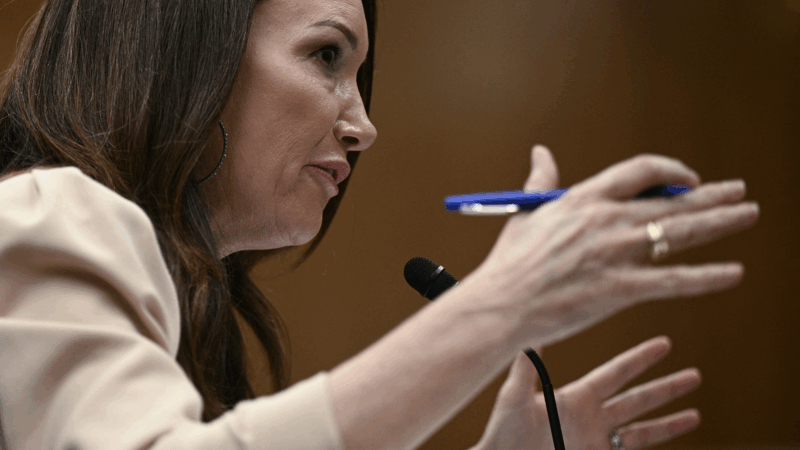USDA chief says agency is trying to fill key jobs after paying 15,000 to leave
In testimony on Capitol Hill on Tuesday and Wednesday, Secretary of Agriculture Brooke Rollins confirmed that the U.S. Department of Agriculture is now looking to fill critical positions, after agreeing to pay more than 15,000 employees’ salaries and benefits through September in exchange for their resignations.
“We are actively looking and recruiting to fill those positions that are integral to the efforts and the key frontlines,” Rollins told members of the Senate Appropriations Committee on Tuesday.
USDA is among the agencies that twice invited employees to quit their jobs through the deferred resignation program — once in late January when the deal was presented to nearly the entire federal workforce, and again for a short window in April. The Trump administration has leaned heavily on the deferred resignation program as it seeks to dramatically downsize the federal workforce.
But the need to fill positions so soon after letting people go has raised questions, including from Sen. Patty Murray of Washington, the top Democrat on the Senate Appropriations Committee.
“So you let people go and you’re looking for new people to fill the positions that they had experience in?” Murray asked.
“We’re having those discussions right now,” Rollins responded, while noting that 15,000 employees represents less than 15% of USDA’s workforce and that the department loses 8,000 to 10,000 employees every year through attrition.
Still, Rollins invited some of those who took the deferred resignation offer to return.
“If they want to come back, and if they were in a key position, then we would love to have that conversation,” she told lawmakers.
Earlier, NPR reported that just a day after employees of USDA’s Animal and Plant Health Inspection Service (APHIS) had left their jobs through the deferred resignation program, human resources sent an email to remaining employees offering them an opportunity to apply for 73 open positions, including ones newly vacant.
One employee who had taken the deferred resignation deal was furious to learn their job was on that list. They had not wanted to resign from their job but felt forced to do so after repeated warnings of mass layoffs ahead. The employee asked to remain anonymous out of fear of reprisal for speaking with the media while still on paid administrative leave.
At Tuesday’s hearing, Rollins acknowledged some mistakes may have been made along the way but insisted that people in key positions were not accepted in the second round of the deferred resignation program.
“We are very intentionally approaching this. Have we done it perfectly? No. Any type of wholescale change and big effort to basically realign an entire government agency is difficult,” she said. “We’re working every day to solve for a lot of this, and I think we’re making a lot of really good progress.”
On Wednesday, Rollins went further, denying that anyone at APHIS had been allowed to accept deferred resignation, or DRP, in April.
“In the last round, we did not accept any DRPs from anyone in [Farm Service Agency] offices or APHIS offices or state veterinarians,” Rollins said at a budget hearing of the House Appropriations Committee.
Her assertion is at odds with another account from an APHIS employee whose separation agreement was seen by NPR. NPR agreed not to name this employee because he also fears retaliation for speaking with the media while on paid administrative leave.
He described seeing stressed IT staff dealing with piles of laptops and cell phones turned in by those departing the government last Wednesday. He added his to the pile.
Armando Rosario-Lebron, a vice president with the National Association of Agriculture Employees, which represents employees in APHIS’ Plant Protection and Quarantine program, believes several hundred of its bargaining unit members could have accepted the deferred resignation offer in April.
USDA did not immediately respond to NPR’s questions about the discrepancy between Rollins’ testimony and these employees’ accounts.
A Jan. 6 rioter pardoned by Trump was convicted of sexually abusing children
A handyman from Florida who received a pardon from President Trump for storming the U.S. Capitol on Jan. 6, 2021, was convicted on state charges of child sex abuse and exposing himself to a child.
A country-pop newcomer’s debut is your reinvention album of 2026
August Ponthier's Everywhere Isn't Texas is as much a fully realized introduction as a complete revival. Its an existential debut that asks: How, exactly, does the artist fit in here?
U.S. unexpectedly adds 130,000 jobs in January after a weak 2025
U.S. employers added 130,000 jobs in January as the unemployment rate dipped to 4.3% from 4.4% in December. Annual revisions show that job growth last year was far weaker than initially reported.
Greetings from Mexico City’s iconic boulevard, where a dog on a bike steals the show
Every week, more than 100,000 people ride bikes, skates and rollerblades past some of the best-known parts of Mexico's capital. And sometimes their dogs join them too.
February may be short on days — but it boasts a long list of new books
The shortest month of the year is packed with highly anticipated new releases, including books from Michael Pollan, Tayari Jones and the late Nobel laureate Mario Vargas Llosa.
Shootings at school and home in British Columbia, Canada, leave 10 dead
A shooting at a school in British Columbia left seven people dead, while two more were found dead at a nearby home, authorities said. A woman who police believe to be the shooter also was killed.






